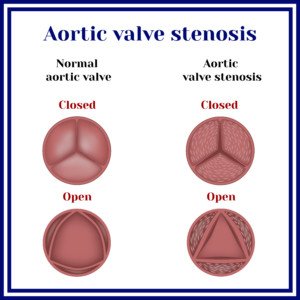
The following symptoms together strongly indicate a serious heart problem: “thumping” heartbeat, dizziness, chest pain and fatigue.
Even three out of the four can suggest this serious problem with the heart: aortic stenosis.
Though these symptoms can be caused by more than one medical condition, one of those conditions is aortic stenosis — which requires surgery if the patient wants significantly improved long-time survival odds.
“Aortic valve allows blood flow from the left ventricle (main pumping chamber of the heart) to the aorta for distribution to various organs,” says Asim Cheema, MD, who’s board certified in internal medicine, cardiovascular diseases and interventional cardiology by the American Board of Internal Medicine. Dr. Cheema is with Your Doctors Online, an online doctor chat site.
“Aortic stenosis causes two problems,” continues Dr. Cheema. “On the left ventricular side, it increases the amount of work for the left ventricle, transmitting increased pressures to the left atrium and pulmonary vessels.
“On the downstream side, the effective blood flow to the body organs including coronary arteries is reduced.
“As a result, patients can have angina (reduced coronary flow), arrhythmia (increased pressure on the atria), shortness of breath (increased pressure in the pulmonary vessels) and low energy/fatigue/poor exercise tolerance due to decreased blood flow to muscle and body in general.
“The left ventricle may eventually become unable to generate enough pressure to push blood through the narrow valve and fail, causing heart failure.”

Source: Shutterstock/Mrs_Bazilio
Treatment of Aortic Stenosis
If you have the symptoms of chest pain with dizziness, fatigue, shortness of breath, a thumping sensation, etc., see a cardiologist immediately for a proper diagnosis.
Open heart surgery isn’t the only treatment option. There is a less invasive procedure that uses the Medtronic CoreValve® System.
A surgeon threads a catheter into the patient’s groin and up to the heart; the catheter deploys the device and places it, where it takes over the diseased valve’s function — allowing more normal blood flow throughout the body, ending the symptoms of chest pain, thumping heartbeat, fainting or dizziness, shortness of breath, fatigue, etc.
Though in isolation, a sensation of a thumping heartbeat is most likely benign, the index of suspicion soars when it’s coupled with chest pain and especially additional symptoms like dizziness.












